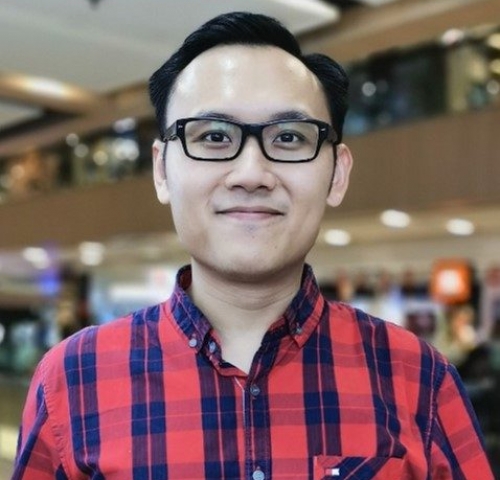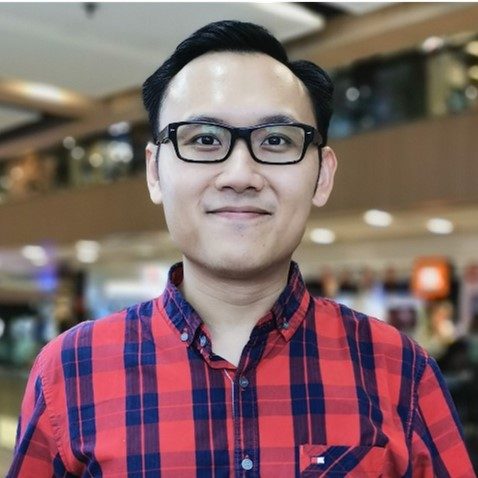
Agus Leonardi Soenjaya
The University of New South Wales
I am a 1st year PhD student at the University of New South Wales, Sydney. I did my master’s degree in Mathematics at UCLA in the States. Before commencing PhD, I worked as a Mathematics teacher at a few international secondary schools in Indonesia. After several years working as a teacher, I found that my passion is to do research and teaching at a higher level, and so I decided to come to Sydney with my wife to do a PhD in Mathematics. My research area is at the intersection of pure and applied Mathematics, specifically on the theoretical and numerical analysis of certain partial differential equations (PDE) that are used to model micromagnetism phenomena, and more broadly on the analysis of PDE that appears in science and engineering.
Can you give me a quick rundown about the type of mathematics you are studying and its potential impacts for the broader community?
Many physical and social phenomena are usually modelled using a set of partial differential equations (PDE) or stochastic partial differential equations (SPDE). These PDE or SPDE capture important aspects of the physical system, and can be used to predict the future states of such system. The diffusion equation, for instance, is an example of a PDE that models the spread of a substance (such as gas, molecules, or even false information) in some specified area. For a lot of more complicated PDE or SPDE, it is unknown whether such model is ‘well-posed’ (meaning the model should give a unique solution for the future state given enough data on the current state, and that an efficient computer simulation of the model should be able to give accurate output for the future state). In my research, I am studying the well-posedness of a class of PDE and SPDE appearing in micromagnetism, as well as designing and analysing efficient numerical methods to simulate such models.
How did you get into mathematics/statistics/data science? Was there someone or something that inspired you to this field?
My high school teacher inspired me to do mathematics at an advanced level. In class, she always encouraged the students to appreciate the theory and the applications of mathematics to real life. She suggested me to read some textbooks containing more advanced mathematics, and I found that really enjoyable. I also did an undergraduate degree in Pure Mathematics and was encouraged by a few professors who mentored me on how to do research, and so here I am doing a PhD in Mathematics.
You received a Travel Grant to attend AMSI Summer School 2023. How important was this in terms of your ability to attend, fully participate in the program and meet others studying in similar fields?
I think it is important to participate in the program in-person, since most meaningful interactions could be more easily done in-person. During the lecture, it is easier to clarify some concepts on the spot, and it is also more effective for the lecturer to teach a subject in-person rather than online.
What was the most valuable part of the program for you?
The course content is particularly valuable for my research. My background is more on the pure mathematics side, but I need some knowledge from the applied side to be able to simulate the model that I am studying. I took a course on the analysis of finite element methods during the summer school, and it turned out to be exactly what I need to be able to move forward with my research. The course was delivered at a suitable pace, and I learnt many new techniques which are useful for my current research.
In the long-term, what do you think are the benefits of having attended Summer School?
The mathematical knowledge gained is certainly beneficial for those intending to pursue more advanced mathematical degree. Connections with the other students and the lecturers would also be important for the future.
Summer School included a special Careers Day program which aims to help give students an idea of the kinds of career paths available to maths graduates in industry and private sector research areas. Were you previously aware of the types of industry opportunities available to mathematical science graduates?
I was aware of the types of opportunities available in the industry, but it was nice to hear in more detail the kind of jobs and career options available from people in the industry themselves. I would consider working with industry in the future should the opportunities arise.
What advice would you give to someone who is considering applying for Summer School in 2024? Should they apply and why?
You should just apply for the summer school and see for yourself where this program could offer. There is always something new for everyone to learn, and it is a great experience for anyone interested to pursue further career in mathematics.
Where do you want the mathematical sciences to take you? Where do you see yourself in five, ten years’ time?
I want to be a researcher and lecturer in mathematics. In five years, I see myself working as a researcher in applied mathematics, where I could apply advanced mathematical techniques to solve real-life problems. I could foresee that many problems of concern in the industries would become more complex, and those with advanced mathematics degree would be well-suited to tackle those challenges.

